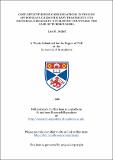Files in this item
Cost-effectiveness considerations in finding appropriate chemotherapy treatments for bacterial diseases in developing countries: The case of tuberculosis.
Item metadata
| dc.contributor.advisor | Malek, M. (Mo) | |
| dc.contributor.author | Bethel, Lisa M. | |
| dc.coverage.spatial | 440 p. | en_US |
| dc.date.accessioned | 2018-05-16T09:52:09Z | |
| dc.date.available | 2018-05-16T09:52:09Z | |
| dc.date.issued | 1996-07 | |
| dc.identifier.uri | https://hdl.handle.net/10023/13345 | |
| dc.description.abstract | Infectious bacterial diseases in developing countries represent a major health threat. Living conditions and environment decrease health status such that those in developing countries are left vulnerable to many diseases that are seldom seen in industrialised countries. Many treatments for these diseases have proven very effective, making infectious bacterial disease one of the best targets for high yield, low cost health interventions. Antibiotics remain the primary approach in treating infectious bacterial disease, yet mismanagement in their use has led to unnecessary resistance making many major diseases difficult to treat. Additionally, poor antibiotic choices for treating diseases have further contributed to unnecessary resistance. The appropriate choice for treating diseases is not always made and many diseases continue to be treated with inappropriate drugs or combinations of drugs. Many treatments are chosen on the basis of their easy availability or their small cost, when in fact other treatments could be obtained that have a more substantial impact on decreasing the incidence of a given disease. This is especially true in the treatment of tuberculosis. Tuberculosis, once thought to have been almost eradicated, has been revived by the growth of HTV. TB still claims a substantial proportion of human lives and will be responsible for 30 million deaths in this decade alone. Of particular relevance is the rising incidence of drug resistant cases of TB, which is primarily due to inappropriate antibiotic use. Although some past research has acknowledged the influence of resistance on the cost of TB treatment in developing countries, few studies have thoroughly analysed this relationship. This thesis presents a comprehensive study of the impact of drug resistance on the cost of TB treatment within the context of a cost-effectiveness analysis comparing short-course chemotherapy and the standard drug regimen in Ethiopia. In addition, the impact of HIV on TB treatment is analysed together with other factors, such as case holding, in order to assess their respective influence on the cost of treatment. Criteria for better management of tuberculosis control efforts in order to eradicate this disease and control resistance are subsequently explored. Finally, a discussion of the broader applicability of the conclusions of these studies to many developing countries is presented. | en_US |
| dc.language.iso | en | en_US |
| dc.publisher | University of St Andrews | |
| dc.subject.lcc | RA644.T7B3 | |
| dc.subject.lcsh | Tuberculosis | |
| dc.title | Cost-effectiveness considerations in finding appropriate chemotherapy treatments for bacterial diseases in developing countries: The case of tuberculosis. | en_US |
| dc.type | Thesis | en_US |
| dc.type.qualificationlevel | Doctoral | en_US |
| dc.type.qualificationname | PhD Doctor of Philosophy | en_US |
| dc.publisher.institution | The University of St Andrews | en_US |
This item appears in the following Collection(s)
Items in the St Andrews Research Repository are protected by copyright, with all rights reserved, unless otherwise indicated.

